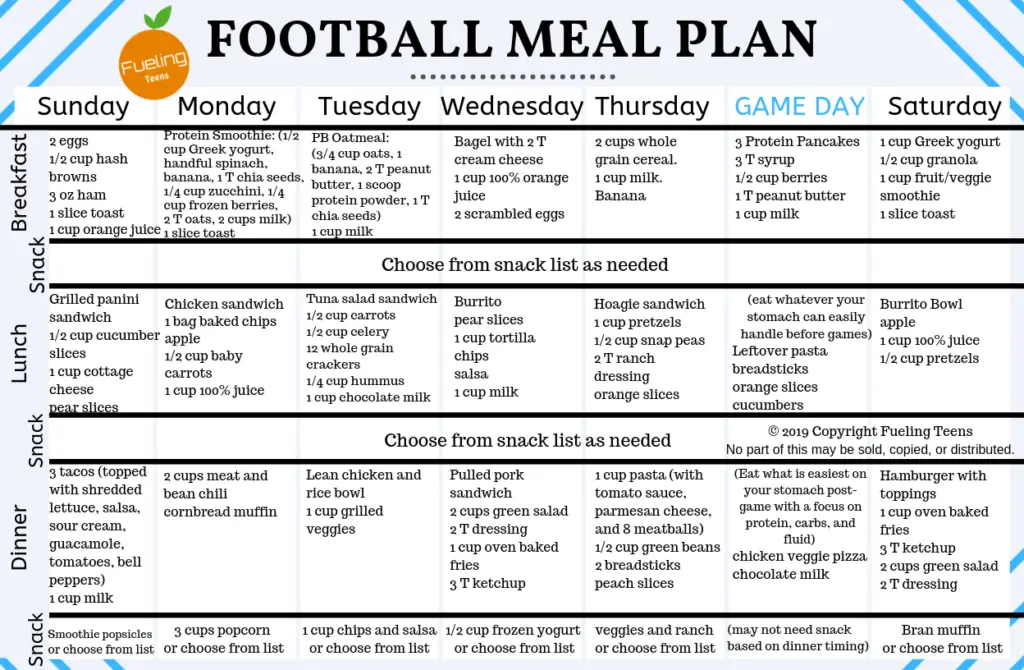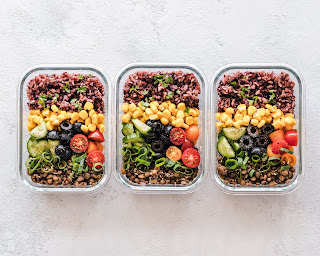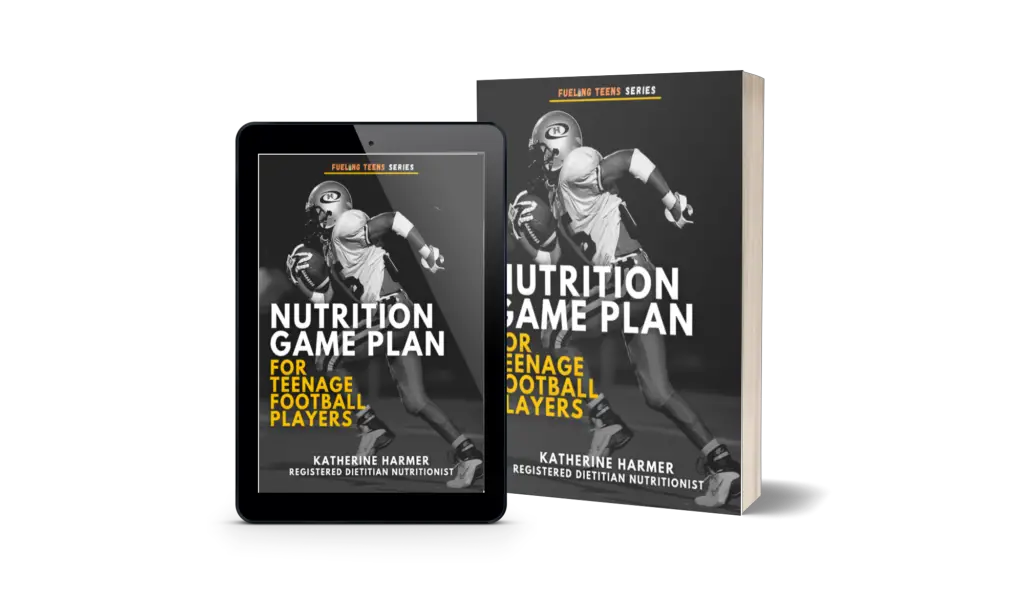Nutrition is just as important as training for a football athlete, especially for a teenage high school football player. What can you do to make sure your student athlete gets the fuel and nutrients needed to perform at the top? Keep reading for a free meal plan for high school football players.
Football training goes well beyond the gym or the field.
Proper nutrition is essential for a high school football athlete. An appropriate nutrition plan will provide the fuel and nutrients to help an athlete train well, recover quickly, and perform at the best of their ability.
High school is an important time to make healthy eating habits that will benefit them for life.
Get your high school football athlete started on a nutrition meal plan that will carry them through the season.
I’ve listed the answers to some common questions for football players regarding protein intake, sports and energy drinks, recommended daily calories, pre- and post- workout foods, plus an outlined nutrition plan below.
Make the most out of the football season and rise above the competition.
Keep reading for the recommended nutrient requirements and get the free meal plan below.
Looking for a little more help and guidance with nutrition this season? I’ve got you covered-
Nutrition Game Plan for High School Football Ebook
All you need to know for a healthy football season! Including a 28-day meal plan, snack idea list, tips for what, when, and how much to eat for football, plus more. Fuel up for your best football season yet and rise above the competition!
Click here for more information.
Parents Please Send Help!
The average high school football player attends practice for 2-3 hours every day after school, with 1-2 games per week, sometimes an extra practice on Saturday, plus homework and other extracurricular activities. The average teenager is busy, so by adding football each day, a high school football player can be extremely busy. Trying to eat a proper diet with this hectic schedule is very difficult, plus many athletes lack the skills to prepare their own meals.
Even with time restrains it is possible for teenage athletes to meet daily nutritional needs. They need the support and help of a parent/guardian, as well as other family members, friends, and coaches.
This age group’s skill level for food preparation is generally low. In writing my meal plans, I assume that at least one parent/guardian helps with grocery shopping and food preparation.
This is also a great time for teenagers to become involved in food preparation to learn cooking skills, proper nutrition, and grocery shopping habits. All of these skills and habits will set them up for longterm success and a healthy lifestyle.
Parents, please help your football player– ensure they are getting an adequate breakfast, have access to food for lunch and snacks, and please do your best to cook a nutritious family dinner. This can be a good time to improve nutrition for the whole family.
How Many Calories Should a High School Football Player Eat?
A football athlete may need anywhere from 2500-4000 calories per day depending on weight, height, activity level, etc.
To find needed calories, take weight in kg (2.2 kg=1 lb) and multiply it by 30-35. That should give you a pretty good range of calories.
In general I would recommend at least 3000 calories per day for a high school football athlete. My meal plans below are written for 3000 calories per day, but can easily be adjusted based on needs.
3000 calories is just an estimate. This is based on the age, average size, and amount of exercise per day for a football athlete (about 2-3 hours of football practice 5-6 days per week). You can also calculate your athlete’s recommended calorie range fairly accurately right here with an online calculator.
I also wrote a post on this whole topic. If you’re interested in more details, check it out here: How Many Calories Does a High School Football Player Need?
I don’t necessarily recommend for teenagers to count calories daily (unless they have specific goals), but to instead learn to eat an appropriate amount of food and nutrients at appropriate times throughout the day. It’s best to learn how to eat by listening to hunger cues and also keeping in mind overall nutrition recommendations to fuel workouts.
What Should A Football Player Eat?
A high school football player should have a balanced diet of each of the macronutrients- carbohydrates, protein, and fat, as well as micronutrients- vitamins and minerals. Here’s a quick example of foods from each of those categories:
- Carbohydrates: Choose carbs from healthier options such as fruit, vegetables, brown rice, sweet potatoes, oatmeal, whole wheat bread/pasta/tortillas, etc. Limit intake of processed carbohydrates such as white bread, sugary cereal, and dessert.
- Protein: Choose poultry, fish, beans, legumes, low-fat dairy and other lean proteins.
- Fat: Choose healthier fats such as olive oil, nuts, seeds, fish, avocados. Limit butter and fried foods.
- Vitamins/Minerals: these micronutrients are found in large amounts in fruits and vegetables, whole grains, dairy, meat and beans, and more. Eat a variety of food of all colors, shapes, and textures from each food groups for the greatest benefit.
This is what sample day would look like for a high school football player:
Breakfast: Usually eaten at home, prepared by themselves or parents. Eat a regular meal focused on healthy carbs and lean protein. This could be:
- Eggs, toast, fruit, and milk
- Oatmeal with fruit
- Granola and greek yogurt
- Green smoothie with eggs
- Whole wheat pancakes/waffles, nut butter, milk
- Avocado toast and fruit
- Whole wheat muffin, slice of ham, fruit
- Whole wheat bagel, eggs, ham
Mid-Morning: Eat a light snack. Get some protein and carbs. Snacks are to be brought from home and eaten during breaks between class or after school before practice.
- Almonds
- Banana or celery with peanut butter
- String cheese and an apple
- Hummus and veggies
- Pretzels and peanut butter
Lunch: Eat a regular meal. Focus on healthy carbs, lean protein, and vegetables. Lunch is best if it is prepared at home and brought to school. School lunch or eating out are also options, but you may need to supplement with additional nutrient-rich foods.
- Sandwich with deli meat, fruit, pretzels, celery
- Chicken and veggie wrap, fruit
- Rice, lean beef, mixed veggies
- Pita with hummus and veggies
Tips for School Lunches: Many high school football players depend on school lunches to meet their nutritional needs. School lunches are designed to give the average student proper nutrition, however they don’t take into account the extra nutritional needs of a high school football player.
USDA requirements for school lunch are often not enough for athletes. High school football players may need to supplement school lunches with food from home, or bring a meal from home.
Pre-Workout Snack: (1-2 hours before workout) Eat something light but with protein and carbs:
- Hummus with whole wheat crackers and veggies
- protein shake
- Greek yogurt with fruit and granola
- String cheese and crackers
- Trail mix
- Apple with peanut butter
- Cottage cheese and fruit
- Cold cereal and milk
- Check out my pre-workout snacks post for more ideas
Post-workout snack: Replenish and refuel with protein, carbs, and fluid. This snack is optional if dinner is soon after practice. If you still have a few hours until dinner and you’re feeling hungry try some of these options:
- Protein shake or smoothie
- Chocolate milk
- Protein bar
- Greek yogurt with fruit
- Check out my post-workout snacks post for more ideas (coming soon)
Also be sure to check out my post on What Should Football Players Eat After a Game?
Dinner: Eat a regular meal. Always eat dinner at home, this is prepared by the parents with help from the athlete. Focus on healthy carbs, lean protein, and vegetables. Here’s some ideas:
- Fish, brown rice, broccoli
- Taco salad
- Chicken, sweet potato, and black beans
- Whole wheat pasta with sauce, meat, and veggies
- Turkey burger and steamed mixed veggies
- Chicken and veggie pizza
Eating Healthier
Based on my experience, the most popular foods that are consumed by high school football players are meat and protein foods, as well as carbohydrate foods. The least consumed are vegetables. The most popular foods are hamburgers, pizza, burritos, french fries, pasta, eggs, and chicken.
Help your athlete eat more vegetables. Veggies are low in calories and provide beneficial nutrients. Eat them however you like -frozen, canned, fresh, cooked, etc. They all have their benefits. Make a list of 5-10 vegetables that your high school athlete will eat and make sure to always have those on hand.
The “favorite” foods listed above are still allowed, but with moderation. Try pairing some of the least popular vegetables with the most popular foods for a better balance at meals.
Need more help and ideas for your football player’s nutrition plan?
FREE One Week Meal Plan for A High School Football Player:
This meal plan is made for 3000 calories per day with 3 meals and 3 snacks, with about 800 calories per meal and 100-300 calories per snack. Keep in mind, many athletes may need more or less calories depending on their size, activity level, and personal goals. You may also need to adjust the schedule and eat less calories for meals and more calories for snacks based on individual preference and tolerance.
On rest days, the calorie level is also lower because less energy is needed with less physical activity.
You’ll also see that I still included a variety of favorite foods- hamburgers, pizza, burritos, but with healthier spins and all in an appropriate balance. Football players don’t need to “diet” during their season, they just need to eat smart.
I hope you find this helpful! It can be a great starting place as you work with your teen and make an individualized plan.

For personal use only. No part of this may be reproduced, sold, copied, or distributed.
Here’s the snack list options that go with the meal plan:
- 1/4 cup hummus with 6 whole wheat crackers and veggies
- 12 oz protein fruit smoothie
- 1 cup Greek yogurt with granola and fruit
- 1 cup low-fat cottage cheese and fruit
- 1/4 cup trail mix
- 1/4 cup almonds and 1 apple
- 1 banana or apple with 1 T peanut butter
- string cheese and 8 whole wheat crackers
- 1.5 cups cereal and 1 cup milk
- 12 oz chocolate milk
- string cheese and an apple
- 1/2 cup pretzels and 1 T peanut butter
- PB&J sandwich
- energy bar
- 1 cup juice and 2 hard-boiled eggs
- rice cake with 1 T nut butter and banana
- string cheese and 4 oz applesauce
Have you checked out my Nutrition Game Plan for High School Football ebook yet? A 28-day meal plan with meals, snacks, plus tips for what, when, and how much to eat.
What Should A Young Football Athlete Drink?
There’s so many choices for hydration- water, gatorade, other sports drinks, chocolate milk, juice….. what do you think is the best type of fluid for a high school football athlete? Water is hands down the best choice (but keep reading to see when sports drinks are appropriate). Water is the most hydrating and best option for most training sessions and sporting events.
If your workouts are one hour or less, or not very intense, just drink water. That’s the best option for fluid. You don’t need anything else- you’ll just be wasting money and probably drinking too much sugar and calories if you choose a sports drink or energy drink.
When Are Sports Drinks Appropriate for Hydration?
You don’t want to be drinking Gatorade, Powerade, or other energy and sports drinks before a training session or game. Hydrate with regular water. Bring lots of water to practice and drink regularly. Sports drinks can occasionally be appropriate during exercise, depending on the length and intensity of your workout.
If your practice is longer than 1 hour and is intense enough, you should consider drinking something with a moderate amount of carbohydrates to maintain your energy levels. This will keep you at your top performance throughout your training session.
Sports drinks are occasionally appropriate when you need to replenish your energy for continued maximum performance during a workout or game. You’ll want a low amount of carbohydrate content in your sports drink, otherwise it will negatively affect your body’s fluid absorption rate. So choose either a sports drink with about 8% carbohydrates, or drink some watered down juice.
Juice or milk, especially chocolate milk, can be appropriate for post-workout beverages. Chocolate milk is a favorite because of the delicious taste, while it also replenishes carbohydrates, protein, and fluid.
For more information and tips on sports drinks, check out my post Should High School Football Players Drink Gatorade?
What Supplements Should a High School Football Player Take?
In general, high schoolers don’t really need any vitamin or mineral supplements, unless a deficiency is likely.
However, a daily multi-vitamin at this life stage may be beneficial to help with growth and development for a high school athlete.
Remember- a good supplement can never make up for a bad diet! It is almost always better to get nutrients from food rather than from supplements of any kind (and I don’t use the words “always” or “never” when talking about nutrition very often!)
Check out my posts: Is Whey Protein Safe for Teenage Athletes? and Is Creatine Safe for High School Athletes?
Related Questions for Game Day:
What Should a High School Football Player Eat Before a Game?
It’s game day and you’ve been training and preparing and want to perform feeling your best with the energy you need. What do you eat to provide this fuel?
Pre-Game Meals: Besides fueling up on carbohydrates the night before a game, eat a big meal about 2-4 hours before kickoff full of easily digestible carbohydrates (see below). Your body will use some of this fuel and store some for your game. Check this out- The Best Time to Eat Pasta Before Football.
As game time approaches, prepare by having one more snack 30 minutes to 1 hour before kickoff. Be sure to include carbohydrates like fruits, vegetables, potatoes, bread, pasta, or cereals, which will provide consistent energy to the body over the next few hours.
Avoid spicy foods, fried foods, and high fat, fiber, and protein foods. Foods like pasta, bread, fruits and vegetables are all great choices to help you build up your glycogen stores before a game.
Pre-Game Snacks should provide moderate amounts of protein, fat, and fiber, and lots of carbohydrates and fluid. The best options are ones that you know your stomach can handle. Now is not the time to try unfamiliar foods and new diets (test those before a practice day). You need to be feeling your best to focus on the game. Here’s some ideas:
- Peanut butter and jelly (or honey) sandwich
- Trail mix
- Granola or protein bar
- Pretzels and grapes
- Bananas and nut butter
What Foods Should High School Football Players Avoid?
I wrote a whole post about the worst foods for football players. Check it out here: The Worst Foods to Eat Before Football. In general you don’t necessarily need to eliminate foods, but rather limit foods. Limit foods with excessive fat, sugar, and salt, and other foods that are high in calories but low in nutrients.
Also worth mentioning are a few things that aren’t necessarily “food” but are commonly consumed among this age and athletic group and should be avoided, including:
- Excessive amounts of supplements
- Excessive amounts of protein- including protein powders and protein bars
- Alcohol (check it out- Should Football Players Drink Alcohol?)
- Excessive caffeine
- Limit sugary treats and desserts, soda, fried foods, fast food, white breads, and sugary cereal.
Summary
- High school football athletes should focus on eating a balanced diet with regular meals throughout the day. Consume healthy carbohydrates, lean protein, and healthy fats.
- Pre-workout snacks and meals should focus on a lot of carbohydrate and fluid with a moderate amount of protein.
- Post-workout snacks and meals should focus on refueling and replenishing carbohydrates, protein, and fluid.
- Think of how much farther your training will take you if you eat right!
Enjoyed these tips and looking for more high school football nutrition recommendations? You can find all my football recommendations in one place in my new ebook- Nutrition Game Plan for High School Football. Check it out!
Check out some of my other football posts:
- Is Whey Protein Safe For Teenage Athletes?
- The Perfect Size for a Football Player
- Should You Eat Before Football?
- The Worst Foods to Eat Before Football?
- What Should Football Players Eat After a Game?
Eat. Fight. Win!
Katherine Harmer, RDN
Fueling Teens is a participant in the Amazon Services LLC Associates Program, an affiliate advertising program designed to provide a means for sites to earn advertising fees by advertising and linking to Amazon.com. We also participate in other affiliate programs which compensate us for referring traffic.




